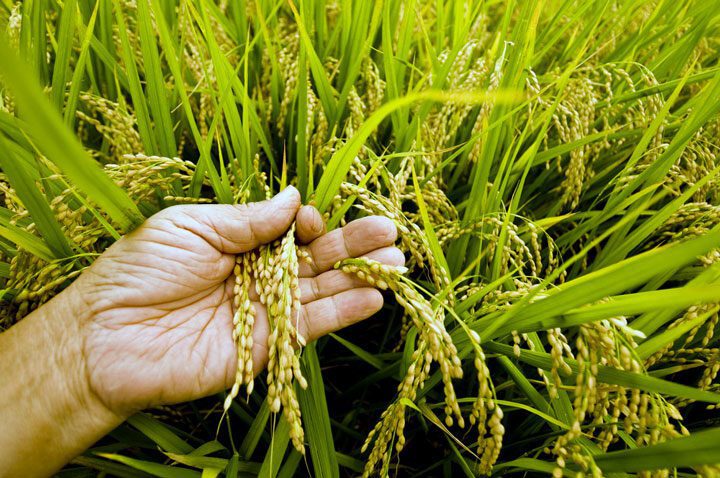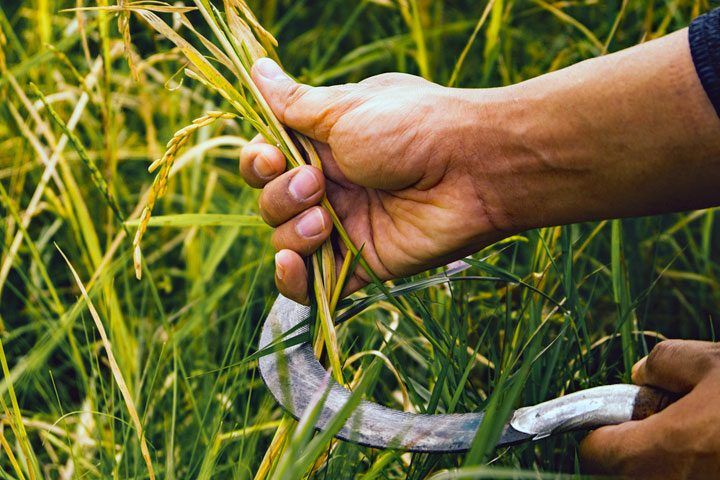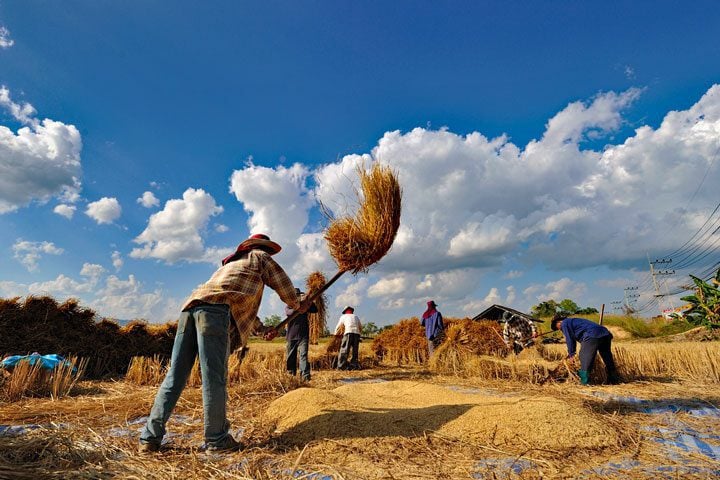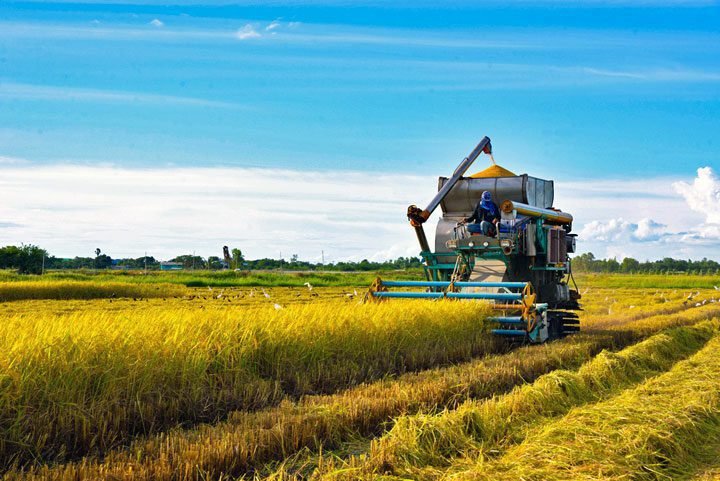Winter in Isan (5)

There is a pleasant bustle in and around the village. Mopeds with sidecar and drive on and on, with might and main they move to the rice fields. The yellow-ripe grains hang promisingly on almost all paddies and spread that delicious saffron-like scent. Quickly free a few walkways on the dikes from the spontaneous greenery that also enjoyed the manure, quickly go to the shops for bags or buy those blue nets with fine mesh.
In short, the village is in turmoil, people have been waiting for this.
On these days you see people you barely know show up, you see elders you thought were just enjoying their old age. No, young and old have been summoned to lend a hand. Chatting comfortably with the six of us in that sidecar where there is hardly room for two. Along the way, stop frequently at passing fellow villagers to have a chat.
And around eight o'clock in the morning you see that typical Isaan image: people bent over, huddled against the sun and wearing hats in the middle of the fields. Making the same movement over and over again: grabbing, cutting, grabbing, cutting and again. Slowly but surely the view of the fields changes.

An hour or two later, the elderly begin to bundle the cut culms with a self-made bamboo string, the bundles are placed together at regular intervals. They will pick them up later, a tractor behind a push tractor slowly hobbles through the field, surrounded by children who pick up the collected bunches and throw them on the cart, they enjoy it, they do that while playing. Dogs happily walk around, sniffing the dikes for rat burrows and when they do discover one, people immediately go there to give the rats the final knock. These are also thrown on the cart, an extra meal for later.
And that will soon be towards evening, everyone gathers where there is a smell of food. The rats go on the barbecue as a snack, the tired dogs get what they don't eat themselves and there is so much that the cats also show themselves without fear of the fully fed dogs.
The following days remain filled with these activities, but now threshing wagons also appear in the area. The bundles of rice grains are collected in the larger yards, separate heaps so that everyone can keep an eye on their own rice. Not so long ago, threshing was still done by hand, many are homesick for it because it was a joyful activity that was performed to the rhythm of singing. But machine threshing is still fun, everyone helps each other, a number of people bring the bunches to the machine, another number stand on top and send the stalks into the greedy thresher. Another part will alternately collect the rice in bags and they will be stacked per person, everyone knows how many bags he or she has.

After threshing it is always fun to get together, a beer or lao kao, some quick snacks. And philosophize about the harvest, was it good or not? A good or bad year for quality?
The whole thing goes at Isaan's pace, slowly but surely. Hectare after hectare is eaten up, cut short with razor-sharp sickles. No one anxiously waiting to see what the harvest will be like after a lousy rainy season. No one who worries about the ominous weather report that a storm is coming. No one who cares in economics, in profit. No one wants to make it go faster.
Except The Inquisitor. He rented a harvester. The rice from the Inquisitor's house arrived in half a day, threshed and all, in sacks ready for sale. Only what is for personal use requires some work: lay it out in the sun to dry, bring it in at night, repeat the next day.
A farang proud of the yield that was about thirty percent higher per rai because of more and better fertilizers. A farang proud of the fact that there is enough yield to live on for a year and with a cost-covering picture because of the sale of what was more. Of course it was only three rai.

And yet The Inquisitor is a bit wistful.
No happy people on the field, just a stinking and roaring machine. No laughter, no beers while threshing because that was done immediately. No cozy get-togethers in the evening after joint work. Nothing unexpectedly funny happens, no enjoying dogs on the field. Don't wait in suspense about the sales price, De Inquisitor already knew that via the internet.
The Inquisitor quickly sets off, assisting the villagers. Enter the manual harvest, collect the bunches. The dogs watch as they indulge their instincts. Threshing along and in the meantime regularly sipping a beer. Sitting together in the evening somewhere in a yard under the trees. Enjoy all the strange dishes including rat meat.
Economy really isn't everything in life.


So, learned something again. Thank you for this.
Well… sometimes you have to choose between convenience and fun…
Regards,
Daniel M.
Hi, you don't have to choose between ease and fun, you can have fun at ease,….
H ...
Wonderful story to read, reminds me of the old days when the hay was still taken from the land and the potatoes were dug up. Everything by hand.
Sincerely,
Ton
Here in Isan, no nets, no sacks, no rice and no water.
Hey Ruud,
Where in Isaan do you not have rice?
Indeed, I have heard that there are places that have had almost no rain. In Prasat, Surin we will also have a much lower yield.
In Khon Kaen.
Part of the problem is caused by the proximity to the city.
There, at the end of the afternoon, much of the rain falls that would fall in the village if the city were not there.
This is caused by the sun-heated concrete, which causes a rising air current above the city to colder layers of air, causing the water vapor in the air to condense into rain.
When that air descends miles outside the city, there is little water left in it and no rain falls in the village.
It is also highly visible in the city. If you drive out of town with rain at the end of the afternoon, it is often dry a few kilometers outside the city.
But there is no water in the reservoir either, so the city is not the only problem.
We're going to have a dry season in the village I'm afraid.
A number of private groundwater wells have also run dry, I have heard.
I don't know how big the problem will be, we'll have to wait and see.
But we haven't even started the hot season yet, so the outlook is not good.
Shouldn't machine-harvested rice be dried on those blue nets first?
Do you recognize that? If you look at the world through rose-colored glasses, it becomes more and more beautiful. You hardly see the less pleasant sides. Everything seems to be beautiful, nice or nice. It actually works the same way with idealization. By idealizing something you make the picture in your head more beautiful or better than it actually is, and here I am talking about the fact that little or no rain has fallen for several years.
So there is no real rice harvest for many farmers, they receive a fee per rai from the government of 1000 baht per Rai, then it will depend on different locations whether there is harvest or not at all. So put on a different color of glasses.
Dear Inquisitor,
Good story again!
In any case, people are in a good mood again and get back to long and hard work
their money.
The motorcycles have all been converted to a sidecar in recent years (no taxi required).
which replaces a pickup well.
Yours faithfully,
Erwin
Maybe the Inquisitor can tell us what the rice actually yielded. An overview per rai of how many kg of rice, how much the cash proceeds from sales per kg and what the costs were. And ultimately the profit per rai. Then the reader also has a better picture and can compare it with, for example, his own rice field. When I read that machines have been used, this means that it has been paid for and that is why things are going well in the region, otherwise it would have been harvested manually because it would be cheaper.
We were able to experience this in the native village of our daughter-in-law in the province of Chiang Rai. There, together with the fellow villagers, they had a threshing machine in a beautiful shed. A nice investment, everyone could have their own rice threshed there. Nice to see. Cooperation with the whole village.
Me, as an old farmer I look at it and think this is different in Holland.
The soil quality is important if you want to have a good yield.
In short, first ensure a good soil structure, then start sowing or planting, you will see that the yield is many percent higher.
If you want farmer's advice, let me know.. good luck…!!